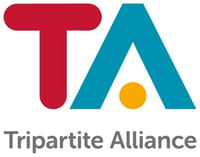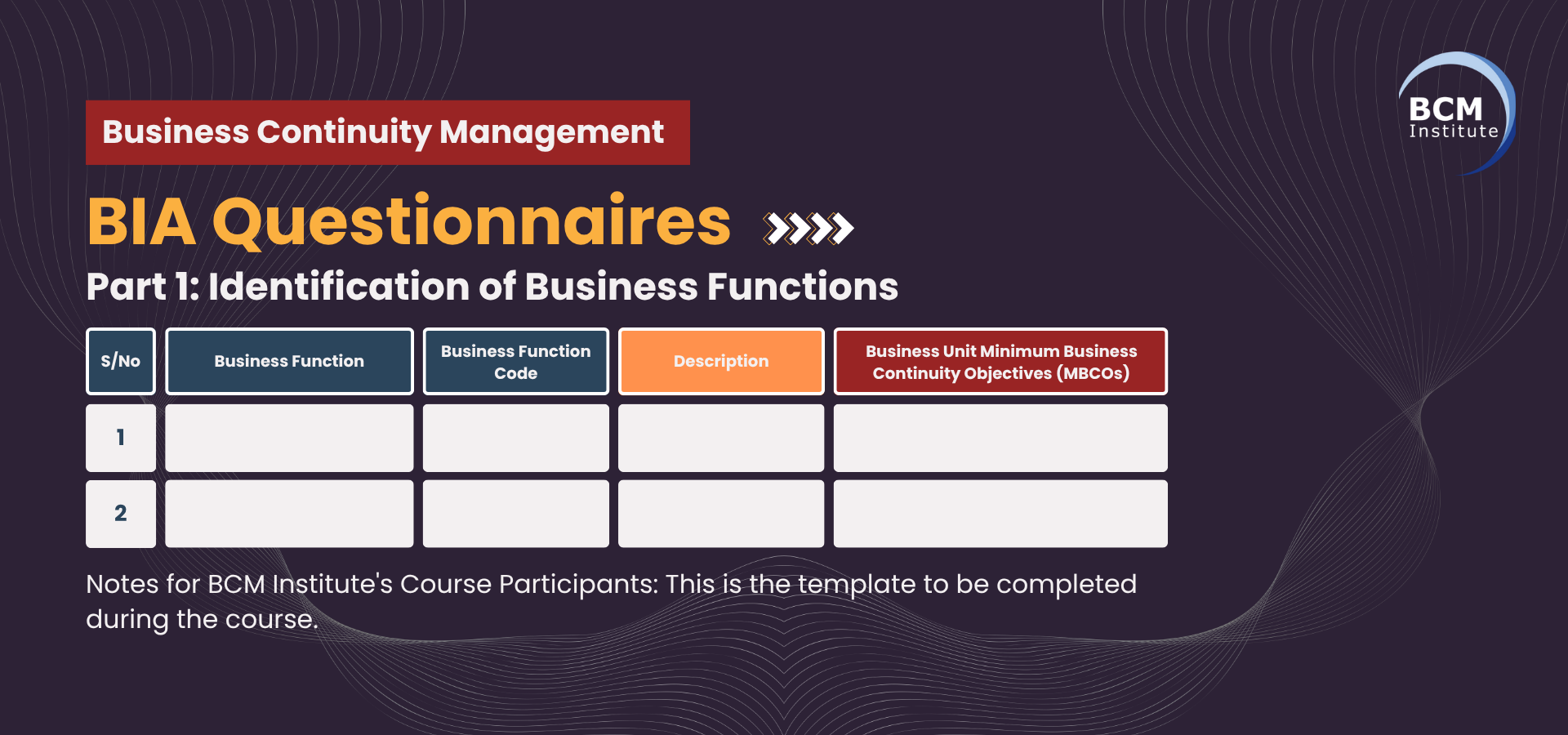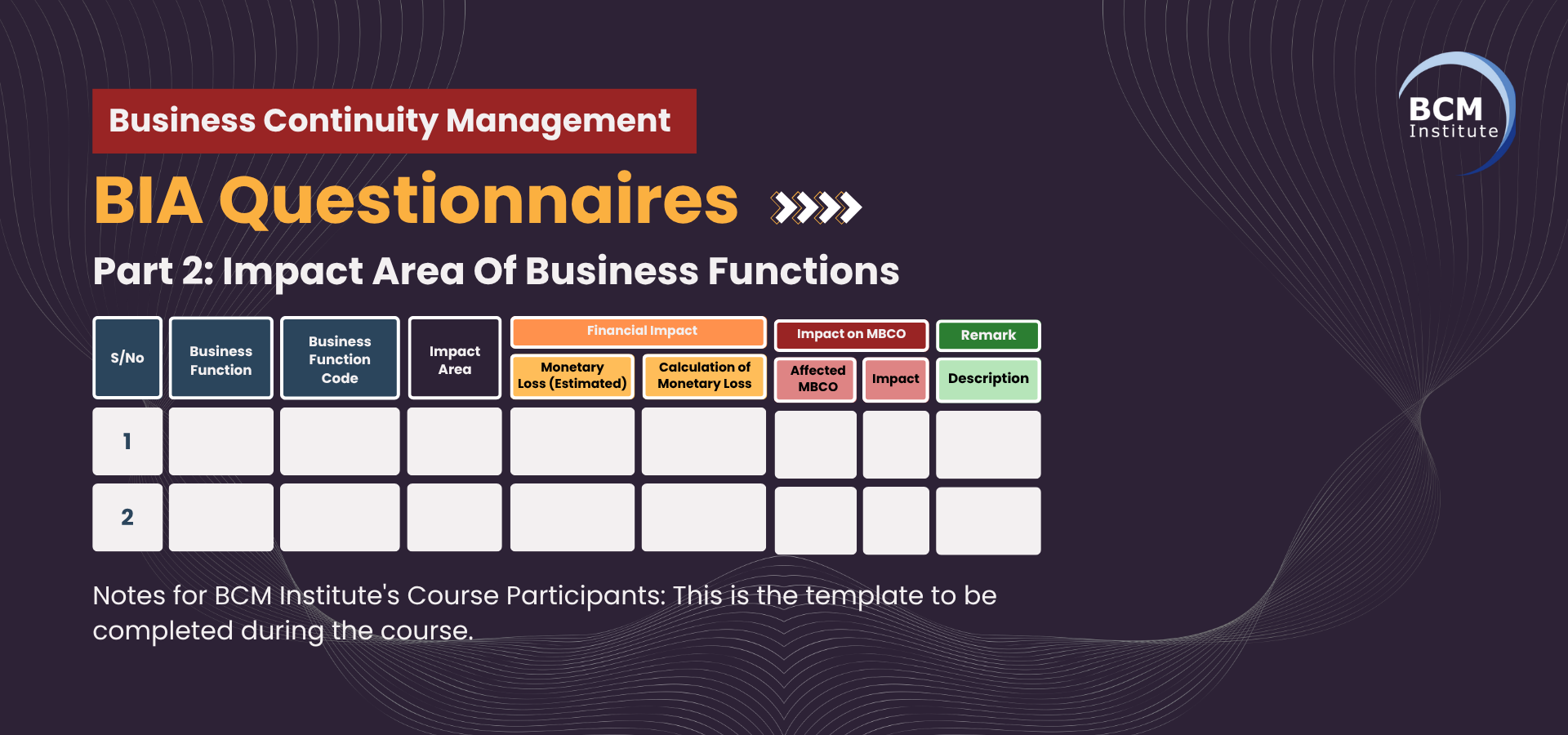Identification of Business Functions for CBF-1 Dispute Management and Advisory Services (via TADM)
![[BCM] [TAL] [E3] [BIA] [T1] [CBF] [1] Dispute Management and Advisory Services (via TADM)](https://no-cache.hubspot.com/cta/default/3893111/fcb583ea-4ac0-4cc6-b48e-9f487b31574e.png)
The first step in developing a robust Business Continuity Management (BCM) plan is the systematic identification of critical business functions that are essential to the continued operation of the organisation.
For Tripartite Alliance Limited (TAL), which plays a vital role in upholding fair and progressive employment practices in Singapore, these functions are not only operationally significant but also carry national socio-economic importance.
This chapter focuses on CBF-1: Dispute Management and Advisory Services (via the Tripartite Alliance for Dispute Management – TADM), one of TAL’s core services. TADM provides advisory and mediation support to resolve employment disputes quickly and amicably.
Any prolonged disruption to this function could severely impact employees' access to justice and the business community’s confidence in Singapore’s tripartite framework.
To ensure continuity, it is critical to identify and assess the sub-functions within this CBF and establish their Minimum Business Continuity Objectives (MBCO). These MBCOs serve as recovery targets that ensure service delivery resumes within acceptable timeframes following a disruption.
Below is the table for CBF-1: Dispute Management and Advisory Services (via TADM) at Tripartite Alliance Limited (TAL), with the relevant fields filled according to BCM best practices for Minimum Business Continuity Objectives (MBCO).
Table: Sub-Critical Business Function and MBCO for CBF-1 Dispute Management and Advisory Services (via TADM)
|
Sub-CBF Code |
Sub-CBF |
Description of CBF |
Business Unit Minimum Business Continuity Objective (MBCO) |
|
1.1 |
Case Intake and Assessment |
Initial intake of employment dispute cases, verifying documentation, and assessing suitability for mediation. |
Resume operations within one business day to avoid backlog and ensure the timely progression of cases. |
|
1.2 |
Advisory and Pre-Mediation Support |
Guiding disputing parties on mediation procedures, legal obligations, and employment rights before formal mediation. |
Resume within 1 to 2 business days to ensure parties are well-informed and mediation remains effective. |
|
1.3 |
Mediation Services |
Facilitating neutral mediation sessions between disputing parties to reach amicable resolutions. |
Must be operational within one business day to meet mandated service timelines and reduce escalations to MOM or courts. |
|
1.4 |
Enforcement and Referral Support |
Supporting the enforcement of mediated agreements and referring unresolved cases to relevant authorities such as MOM or the Employment Claims Tribunals. |
Resume within 2 business days to ensure compliance with statutory processes and prevent legal delays. |
|
1.5 |
Stakeholder Engagement and Case Escalation |
Managing communication and coordination with stakeholders, including unions, employers, MOM, and legal bodies in complex or escalated cases. |
Operational within 3 business days to maintain stakeholder confidence and ensure seamless escalation and resolution. |
|
1.6 |
Records Management and Case Closure |
Finalising and documenting case resolutions, ensuring confidentiality, and archiving case files in compliance with data governance standards. |
Resume within 3 to 5 business days to ensure regulatory compliance and maintain information integrity for audit or follow-up. |
|
1.7 |
Crisis Communication and Continuity Activation |
Coordinating internal and external communication in the event of disruption, and activating business continuity protocols for dispute services. |
Must be operational immediately (within 0.5 business days) to manage stakeholder expectations and enable rapid restoration of dispute resolution operations. |
Summing Up ... for Part 1
Identifying the sub-functions within CBF-1: Dispute Management and Advisory Services and assigning realistic Minimum Business Continuity Objectives (MBCO) is a foundational step in ensuring TAL’s operational resilience.
By prioritising recovery timeframes based on the criticality of each sub-function—from case intake to crisis communication—TAL positions itself to respond effectively to disruptions while maintaining public trust and stakeholder confidence.
As the provider of a critical public service, TAL must ensure that dispute resolution mechanisms remain available, accessible, and responsive even in adverse situations.
The structured identification and classification presented in this chapter will inform the subsequent stages of the BCM planning process, including risk assessment, business impact analysis, and continuity strategy development.
CBF-1: Dispute Management and Advisory Services (via TADM)
Understanding the impact areas of critical business functions is essential in Business Continuity Management (BCM) to ensure that disruption consequences are accurately assessed and mitigated.
In the context of the Tripartite Alliance Limited (TAL), the Dispute Management and Advisory Services delivered through the Tripartite Alliance for Dispute Management (TADM) represent one of the organisation’s most vital business functions.
This chapter explores the detailed sub-components of CBF-1 and evaluates how each sub-CBF affects TAL’s operations, stakeholders, and reputation.
By assessing the impact areas, financial implications, and potential disruptions to Minimum Business Continuity Objectives (MBCO), this analysis offers TAL a structured view of its operational risk exposure.
The section leverages BCM best practices and aligns with standards outlined in ISO 22301 to facilitate preparedness and decision-making in crises.
The detailed table for the Sub-CBFs under CBF-1: Dispute Management and Advisory Services (via TADM), followed by the introduction and conclusion for the chapter titled "Part 2: Impact Area of Business Functions".
Table: Impact Assessment of CBF-1 Dispute Management and Advisory Services (via TADM)
|
Sub-CBF Code |
Sub-CBF |
Impact Area |
Financial Impact - Monetary Loss (Estimated) |
Financial Impact - Calculation of Monetary Loss (State Formula for Calculations) |
Impact on MBCO - Affect MBCO |
Impact on MBCO - Impact |
Remarks - Description |
|
1.1 |
Case Intake and Assessment |
Operational Disruption, Reputational |
SGD 10,000–30,000/ day |
No. of unassessed cases x avg. penalty/claim delay x SGD 500 |
Yes |
Delay in intake affects overall caseload efficiency, leading to dissatisfaction among disputing parties and negative public image |
Includes online and in-person intake; initial triage and eligibility check for advisory or mediation |
|
1.2 |
Advisory and Pre-Mediation Support |
Operational, Compliance, Legal |
SGD 15,000/day |
No. of advisory sessions missed x avg. Value of unresolved disputes (SGD 1,500) |
Yes |
Missed advisory steps lead to uninformed disputants, escalated conflicts, or prolonged dispute duration |
Offers legal and employment advice before mediation, crucial for fair resolution |
|
1.3 |
Mediation Services |
Reputational, Legal |
SGD 50,000–100,000/week |
No. of cancelled/postponed mediations x avg. settlement value (SGD 5,000) |
Yes (Core) |
Core mandate of TADM. Disruption would directly violate statutory service expectations and trigger significant stakeholder complaints |
Voluntary mediation for employment disputes, supports harmonious labour relations |
|
1.4 |
Enforcement and Referral Support |
Compliance, Legal |
SGD 20,000–60,000/month |
No. of failed enforcement/referrals x avg. claimant loss (SGD 2,000) |
Yes |
Failure to support enforcement damages trust in system and leads to increased legal escalations |
Includes issuing referrals to ECT, MOM, and other authorities; compliance monitoring |
|
1.5 |
Stakeholder Engagement and Escalation |
Reputational, Strategic |
SGD 25,000/event |
No. of mismanaged escalations x estimated reputational recovery cost |
Indirectly |
Poor handling of escalated cases affects long-term partnerships with unions, employers, and government agencies |
Manages high-risk or politically sensitive employment disputes |
|
1.6 |
Records Management and Case Closure |
Compliance, Regulatory |
SGD 5,000–10,000/month |
No. of delayed closures x compliance penalty (SGD 500–1,000) |
Yes |
Incomplete or inaccurate case records compromise audits, reviews, and legal references |
Final step in case lifecycle; includes data retention, closure documentation |
|
1.7 |
Crisis Communication & Continuity Activation |
Strategic, Public Confidence |
SGD 100,000/incident |
Cost of response x incident duration x reputation impact multiplier |
Yes (During Disruption) |
Delayed or inaccurate crisis communication worsens public fallout and affects TAL’s credibility |
Addresses continuity of services during strikes, cyberattacks, data breaches, or public health crises |
Summing Up … for Part 2
This chapter has outlined the granular impact of each sub-function within TAL’s dispute resolution framework.
The Sub-CBFs detailed above are not only operationally critical but are also legally and reputationally sensitive. Disruption to these functions could lead to cascading failures across other departments, a breach of statutory obligations, and significant loss of public trust.
By quantifying potential financial losses and mapping them to critical impact areas, TAL can better prioritise its mitigation strategies and resource allocations.
This impact-centric approach reinforces resilience, ensures continuity of advisory and mediation services, and upholds the organisation’s commitment to tripartite collaboration and fair employment practices in Singapore.
More Information About Business Continuity Management Courses
To learn more about the course and schedule, click the buttons below for the BCM-300 Business Continuity Management Implementer [BCM-3] and the BCM-5000 Business Continuity Management Expert Implementer [BCM-5].







![[BCM] [TAL] [E3] [BIA] MBCO Corporate MBCO](https://no-cache.hubspot.com/cta/default/3893111/9080a06b-c2f0-4a72-988a-4cd13ce54f47.png)
![[BCM] [TAL] [BIA] [P&S] Key Product and Services](https://no-cache.hubspot.com/cta/default/3893111/307ac053-1aed-4e21-b430-f356dd86bc3c.png)
![[BCM] [TAL] [E3] [RAR] [T1] List of Threats](https://no-cache.hubspot.com/cta/default/3893111/8c1a66cb-c0ae-4de9-9d03-8887d6d6788b.png)
![[BCM] [TAL] [E3] [RAR] [T2] Treatment and Control](https://no-cache.hubspot.com/cta/default/3893111/3b9018e6-d96e-4bfa-84b6-deb76c12ec26.png)
![[BCM] [TAL] [E3] [RAR] [T3] Risk Impact and Likelihood Assessment](https://no-cache.hubspot.com/cta/default/3893111/0b422c49-9f00-4c20-be6e-4be73551cb59.png)
![[BCM] [TAL] [E3] [BCS] [T1] Mitigation Strategies and Justification](https://no-cache.hubspot.com/cta/default/3893111/1670f67f-f97f-42d9-bdc8-ce26cc17f035.png)
![[BCM] [TAL] [E1] [C10] Identifying Critical Business Functions](https://no-cache.hubspot.com/cta/default/3893111/03d6ce68-f61f-4fdf-bbfe-0fb4921f10c7.png)
![[BCM] [TAL] [E3] [BIA] [DP] [CBF] [1] Dispute Management and Advisory Services (via TADM)](https://no-cache.hubspot.com/cta/default/3893111/fa99579d-3ea6-4ce4-bdc3-59990b67050a.png)
![[BCM] [TAL] [E3] [BIA] [T2] [CBF] [1] Dispute Management and Advisory Services (via TADM)](https://no-cache.hubspot.com/cta/default/3893111/2cc73eb6-95eb-4a5f-91c2-48762fb97f32.png)
![[BCM] [TAL] [E3] [BIA] [T3] [CBF] [1] Dispute Management and Advisory Services (via TADM)](https://no-cache.hubspot.com/cta/default/3893111/d4863fde-e9d8-4107-94e0-a46ac2d39a76.png)
![[BCM] [TAL] [E3] [BCS] [T2] [CBF] [1] Recovery Strategies](https://no-cache.hubspot.com/cta/default/3893111/b4cbdf20-029f-4a56-bdf1-061ead0c0751.png)
![[BCM] [TAL] [E3] [BCS] [T3] [CBF] [1] Minimum Resources Required during a Disaster](https://no-cache.hubspot.com/cta/default/3893111/056923e5-8bfb-47bb-a2e1-fc93b9241f88.png)
![[BCM] [TAL] [E3] [PD] [CBF] [1] Dispute Management and Advisory Services (via TADM)](https://no-cache.hubspot.com/cta/default/3893111/81039579-840a-4cfb-8fe8-44d3ec828153.png)


![Register [BL-B-3]*](https://no-cache.hubspot.com/cta/default/3893111/ac6cf073-4cdd-4541-91ed-889f731d5076.png)



![FAQ [BL-B-3]](https://blog.bcm-institute.org/hs-fs/hubfs/hub_generated/resized/9b7f5669-8ad6-450b-a98f-5f5d49ebfc8e.png?width=150&height=150&name=9b7f5669-8ad6-450b-a98f-5f5d49ebfc8e.png)
![Email to Sales Team [BCM Institute]](https://no-cache.hubspot.com/cta/default/3893111/3c53daeb-2836-4843-b0e0-645baee2ab9e.png)





